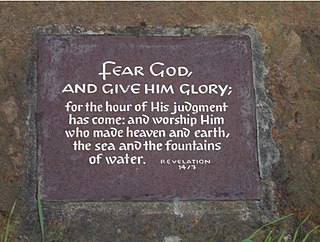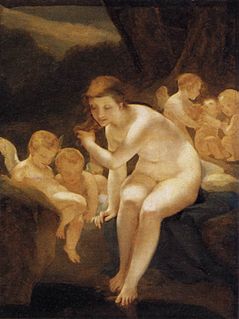 W
WApotheosis is the glorification of a subject to divine level and most commonly, the treatment of a human like a god. The term has meanings in theology, where it refers to a belief, and in art, where it refers to a genre.
 W
WReligious cosmology is an explanation of the origin, evolution, and eventual fate of the universe, from a religious perspective. This may include beliefs on origin in the form of a creation myth, subsequent evolution, current organizational form and nature, and eventual fate or destiny. There are various traditions in religion or religious mythology asserting how and why everything is the way it is and the significance of it all. Religious cosmologies describe the spatial lay-out of the universe in terms of the world in which people typically dwell as well as other dimensions, such as the seven dimensions of religion; these are ritual, experiential and emotional, narrative and mythical, doctrinal, ethical, social, and material.
 W
WDisputationes, also referred to as De Controversiis or the Controversiae, is a work on dogmatics in three volumes by Robert Bellarmine.
 W
WDivinity or the divine are things that are either related to, devoted to, or proceeding from a deity. What is or is not divine may be loosely defined, as it is used by different belief systems.
 W
WEconomic ethics combines economics and ethics, uniting value judgements from both disciplines in order to predict, analyse and model economic phenomena. It encompasses the theoretical ethical prerequisites and foundations of economic systems. The school of thought dates back to the Greek philosopher Aristotle, whose Nicomachean Ethics describes the connection between objective economic principle and the consideration of justice. The academic literature on economic ethics is extensive, citing such authority as natural law and religious law as influences to normative rules in economics. The consideration of moral philosophy, or the idea of a moral economy, for example, is a point of departure in assessing behavioural economic models. Ethics presents a trilemma for economics, namely in standard creation, standard application, and who the beneficiaries of good, by these standards, should be. This, in conjunction with the fundamental assumption of rationality in economics, creates the link between itself and ethics as it is ethics which, in part, studies the concepts of right and wrong.
 W
WEntering heaven alive is a belief held in various religions. Since death is the normal end to an individual's life on Earth and the beginning of afterlife, entering heaven without dying first is considered exceptional and usually a sign of a deity's special recognition of the individual's piety.
 W
WIn religion, a false prophet is a person who falsely claims the gift of prophecy or divine inspiration, or to speak for God, or who makes such claims for evil ends. Often, someone who is considered a "true prophet" by some people is simultaneously considered a "false prophet" by others, even within the same religion as the "prophet" in question. In a wider sense, it is anyone who, without having it, claims a special connection to the Deity and sets him or herself up as a source of spirituality, as an authority, preacher, or teacher. Analogously, the term is sometimes applied outside religion to describe someone who fervently promotes a theory that the speaker thinks is false.
 W
WFear of God refers to fear or a specific sense of respect, awe, and submission to a deity. People subscribing to popular monotheistic religions might fear divine judgment, hell or God's omnipotence.
 W
WInnocence is a lack of guilt, with respect to any kind of crime, or wrongdoing. In a legal context, innocence is to the lack of legal guilt of an individual, with respect to a crime. In other contexts, it is a lack of experience.
 W
WIntegral yoga, also called supramental yoga, is the yoga-based philosophy and practice of Sri Aurobindo and The Mother. Sri Aurobindo finds that there has always been impulse or longings in humans in search for God, Light, Bliss, Freedom, Immortality which has presented itself in a right place in a sequence, which Nature is seeking to evolve beyond mind. This sequence on one end which depicts Life is already involved in Matter and mind in life, leading to the understanding that currently the mind is also a veil of higher states which are beyond mind. Nature via the said impulses would gradually prepare for a higher living and a diviner life.
 W
WJudgement in an afterlife, in which ones deeds and characteristics in life determine either punishment or reward, is a central theme of many religions. Almost all religions are greatly devoted to the afterlife, emphasizing that what you do in your current life affects what happens to you after death.
 W
WStories of miraculous births often include conceptions by miraculous circumstances and features such as intervention by a deity, supernatural elements, astronomical signs, hardship or, in the case of some mythologies, complex plots related to creation.
 W
WOrthodoxy is adherence to correct or accepted creeds, especially in religion.
 W
WPride is a positive emotional response or attitude to something with an intimate connection to oneself, due to its perceived value. This may be one's own abilities or achievements, positive characteristics of friends or family, or one's country. Richard Taylor defined pride as "the justified love of oneself", as opposed to false pride or narcissism. Similarly, St. Augustine defined it as "the love of one's own excellence", and Meher Baba called it "the specific feeling through which egoism manifests."
 W
WIn religion, a prophet is an individual who is regarded as being in contact with a divine being and is said to speak on behalf of that being, serving as an intermediary with humanity by delivering messages or teachings from the supernatural source to other people. The message that the prophet conveys is called a prophecy.
 W
WResurrection or anastasis is the concept of coming back to life after death. In a number of religions, a dying-and-rising god is a deity which dies and resurrects. Reincarnation is a similar process hypothesized by other religions, which involves the same person or deity coming back to live in a different body, rather than the same one.
 W
WIn a religious context, sin is a transgression against divine law. Each culture has its own interpretation of what it means to commit a sin. While sins are generally actions, any thought, word, or act considered immoral, selfish, shameful, harmful, or alienating might be termed "sinful".
 W
WA Soulcatcher or soul catcher is an amulet (Aatxasxw) used by the shaman (Halayt) of the Pacific Northwest Coast of British Columbia and Alaska. It is believed by Tsimshian that all soulcatchers were constructed by the Tsimshian tribe, and traded to the other tribes.
 W
WTheistic evolution, theistic evolutionism, evolutionary creationism, or God-guided evolution are views that regard religious teachings about God as compatible with modern scientific understanding about biological evolution. Theistic evolution is not in itself a scientific theory, but a range of views about how the science of general evolution relates to religious beliefs in contrast to special creation views. Theistic evolutionists accept the scientific consensus on the age of the Earth, the Big Bang and evolution.